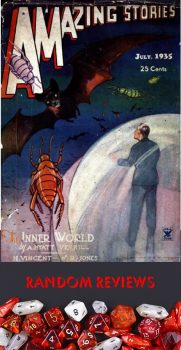Random Reviews: “The Weather Master,” by Arthur Cave

Arthur Cave’s only science fiction story appeared in the July 1935 issue of Amazing Stories. The story looks into the far future of 1980 and while Cave depicts a few aspects of that distant year with some relative success, overall his view of the world seems grounded in a much simpler time.
“The Weather Master” was published in 1935 when the United States and the Soviet Union were engaging in cultural exchanges and an attempt to normalize relations and the Cold War wouldn’t begin in earnest for another decade, Cave foresaw the tension between the superpowers. His 1980 sees a hot war between the two nations with Russia having wiped out the US air fleet and the President working with his War Council to come up with their next steps.
Those next steps involve Professor Wilton, America’s leading (generic) scientist, who just happens to show up at the White House demanding an audience with the President, a demand which is granted, although the President only agrees to give him two and a half minutes. Wilton had spent the past two years incommunicado on an arctic expedition and was widely believed to have died. Instead, he has learned how to control the weather, which provides his answer to how to victoriously end the war with Russia.
When the War Council rejects Wilton’s proposal, he announces that in retaliation he will use his weather skills to shut down the entire country, although he would do it in a way that wouldn’t allow the Russians to take advantage of the situation. Once the White House relents and agrees to let him help them, Wilton raises the fog he brought down on the country and helps them win the war.
Wilton has already demonstrated that he is an egotist and unreliable, yet the President isn’t prepared for his demands for a reward. Perhaps demonstrating a simpler time, Wilton, who has previously just wandered into the White House, now is shown to be armed in the White House. He stuns the assembled members of the Council and flees to exact his revenge via weather control.
Having previously relied on Wilton as the one person who ended the war, the President now relies on Bernard Lane as the one person who can neutralize Wilton, despite having no prior knowledge of Lane. With this commission, Lane takes after Wilton and manages to disable the weather control apparatus.
Although Cave has some interesting ideas, but the over-simplistic view of the world overshadows them. Furthermore, Cave doesn’t really explain them, instead allowing first Wilton and later Lane briefly explain what they are doing, but their explanations lack any sense of verisimilitude. The story is very much in line with the idea of the great man in history, whether it is Wilton or Lane, and positing that scientists are more important the politicians, as evidenced by the fact that the President is anonymous and entirely reactive.
“The Weather Master” is a story from the early ears of science fiction, Campbell wouldn’t take the reins of Astounding until two years later. It is a good example of the sort of fiction being published in that era, where ideas were more important than creating realistic relationships or social scenarios, although several authors who were writing at the time demonstrated that it was possible to include those aspects in science fiction stories.
 Steven H Silver is a nineteen-time Hugo Award nominee and was the publisher of the Hugo-nominated fanzine Argentus as well as the editor and publisher of ISFiC Press for 8 years. He has also edited books for DAW, NESFA Press, and ZNB. His most recent anthology is Alternate Peace and his novel After Hastings was published in 2020. Steven has chaired the first Midwest Construction, Windycon three times, and the SFWA Nebula Conference 6 times. He was programming chair for Chicon 2000 and Vice Chair of Chicon 7.
Steven H Silver is a nineteen-time Hugo Award nominee and was the publisher of the Hugo-nominated fanzine Argentus as well as the editor and publisher of ISFiC Press for 8 years. He has also edited books for DAW, NESFA Press, and ZNB. His most recent anthology is Alternate Peace and his novel After Hastings was published in 2020. Steven has chaired the first Midwest Construction, Windycon three times, and the SFWA Nebula Conference 6 times. He was programming chair for Chicon 2000 and Vice Chair of Chicon 7.